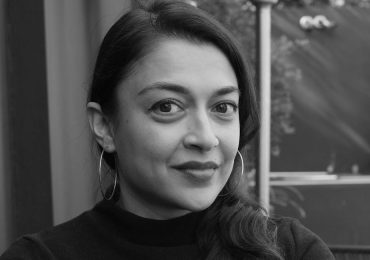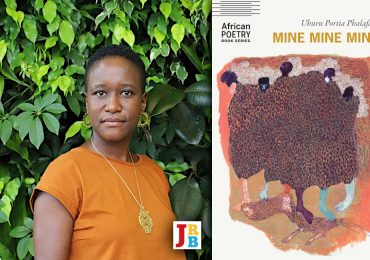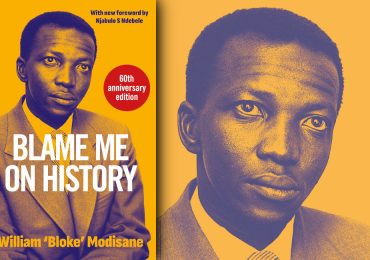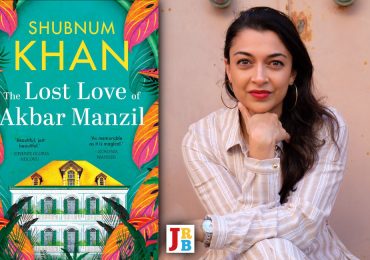The second annual Abantu Book Festival kicked off in Soweto today, and festival director Thando Mgqolozana emphasised the event’s focus on leaving a legacy: this year, every child attending will receive a free book in their mother tongue, and local libraries will be stocked with local literature.
It was also revealed that the Abantu Book Festival may rotate around South Africa in future years.
It had all begun like a dream. You know, that sort of dream which seems to have originated from nowhere, yet one was always aware of its existence. One could feel it, one could be directed by it; unconsciously at first, until it became a reality, a Presence.
—Buchi Emecheta, Second-class Citizen (1974)
Abantu patron in chief Sabelo Mcinziba made the opening remarks at the media launch, beginning with the above quotation by Buchi Emecheta, and also referring to Ghanaian author Ayi Kwei Armah’s The Beautyful Ones Are Not Yet Born.
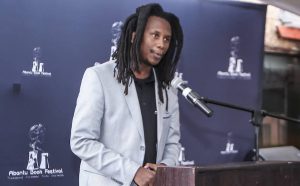
‘Last year, we met here at the inaugural Abantu Book Festival. To those who were here last year, you were not witnesses, but also midwives in the process and event of giving birth to this beautiful one who is now born,’ Mcinziba said.
‘Our motto, “imagining ourselves into existence”, greatly echoes the sentiments of the above quote, from Buchi Emecheta, whose body was laid to rest this year, while her soul lives through everything that we do.
‘Dream. Existence. Feeling. Reality. Presence. Whether positive or not, these are the things that know only too well as black people. We gather here today to do exactly those things. To dream, to exist, to feel, to reconstruct our reality, to firmly establish our presence.
‘With this, we can truly say Abantu is an annual event.’
Future plans to travel around Mzansi
Mgqolozana revealed that the Abantu Book Festival is workshopping the idea of rotating the event around South Africa in the future.
.@thando_mgqo also reveals that @Abantu_ may begin rotating around South African cities in future. Cities will submit proposals to host the event. #AbantuBookFest
— Jennifer Malec (@projectjennifer) December 7, 2017
‘We’ve got people in Cape Town and everywhere tweeting us and saying, when are you coming here? So we’ll grow it here a little bit in Soweto, but we’ve got different cities applying to host Abantu Book Festival, and we can tell them what our requirements are. We’ll talk about getting books into the area’s libraries, so that when we leave there there’s a real legacy.”
Children’s programme, with free books
For the first time this year, Abantu has a children’s programme, curated by Gcina Mhlophe, and every child that attends will receive a free book—in their home language. Mgqolozana said he felt the festival ‘would have failed’ if it did not introduce a space for young readers.
We love the kids. #AbantuBookFest pic.twitter.com/grc19qIsSm
— Abantu Book Festival (@Abantu_) December 7, 2017
‘The children’s programme is very important to me,’ Mgqolozana says. ‘There are all these things that we say, like we don’t read, so I think we have to focus on children.
‘We want to make sure that every child that comes here goes home with a book, and not just any book, a book in their mother tongue. So we’ve got hundreds of copies of Sindiwe Magona’s Folk Tales in the different languages so kids will be able to pick up a copy in their mother tongue and take it home. And Sindiwe Magona has agreed to sign all of them.’
Stocking libraries with South African literature
Libraries are another focus of this year’s festival, including a workshop for librarians titled ‘Turning the Library in Africa into a truly African Library’, facilitated by Simamkele Dlakavu and Zukiswa Wanner.
‘In this country you’ve had colonisation and its appendage, apartheid, and this meant that you did not have libraries in our communities, and when you did they did not have the relevant literature. In the last two decades you saw libraries, big libraries, being built everywhere, but when you walk in you still don’t find relevant literature. In fact, a lot of these functional libraries that you find in the townships are sponsored from outside, and they do not just bring money, they bring literature. So you find literature from Canada, Australia, and everywhere.
‘I find that there’s not a real connection between our communities and the libraries that are there. And I think we need to do something about it. So one of the partnerships we got into is to get the Gauteng Department of Sports, Arts and Culture to buy at least two copies of each of the invited authors and put them into all 233 municipal libraries in Gauteng. So that is going to be happening between now and January. And I’m hoping that this is a long-term thing, because after three, four years the contents of the library changes.
‘In future a kid from here will walk into a library and find literature in which they can find themselves. Which is how I became a reader and a writer. I could only count myself as that when I could find literature that resonated with me. And this is my desire for people like me.’
‘This remains a book festival for black writers and readers’
Mgqolozana wrapped up by restating Abantu’s core values.
.@Abantu_ remains a festival for black writers and black readers. And that is not controversial. – @thando_mgqo #AbantuBookFest pic.twitter.com/OGkJpLxnVS
— Jennifer Malec (@projectjennifer) December 7, 2017
‘This remains a book festival for black writers and readers. And this is not controversial, this is a fact. I don’t think we need to overstate the reasons for it, but it’s something that I want to say on this platform, to put out there one more time. Black writers and black readers are the people we are going to centre in our every activity. Forever, if we live that long.’
This year’s Abantu Book Festival takes place from 7-10 December in Soweto, at the Eyethu Lifestyle Centre in Mofolo during the day and at the Soweto Theatre in the evening. Day events are free, evening events cost R20 per person. Guests attending the evening events are advised to book their seats early.
This year’s impressive guest list includes Zakes Mda, Tsitsi Dangarembga, Zubeida Jaffer, Gcina Mhlophe, Grace Musila, Kopano Matlwa, Ayobami Adebayo, Keorapetse Kgositsile, Mandla Langa, Shubnum Khan, Sisonke Msimang, Zethu Matebeni, Redi Tlhabi, Pumla Dineo Gqola, and many others.
.@African_Flavas table looking beautiful as always at @Abantu_ #AbantuBookFest pic.twitter.com/oN5kxVj34g
— Jennifer Malec (@projectjennifer) December 7, 2017
And the buying of books begins. @African_Flavas #AbantuBookFest pic.twitter.com/Pj7wRTpNey
— Abantu Book Festival (@Abantu_) December 7, 2017
All your faves are here. #AbantuBookFest pic.twitter.com/N6ONaQKGju
— Abantu Book Festival (@Abantu_) December 7, 2017

